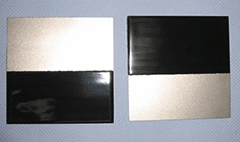Coating system for chemical resistance and extreme adhesion to stainless steel
- Details
- Hits: 9500
 Ceramic Polymer has launched a new, solvent-free interior tank coating with extremely high protective functions. Thanks to the special physical properties of this new development, stainless steel is reliably protected against severe corrosion damage. The new development is absolutely resistant to a large number of chemicals and gases up to a permanent operating temperature of 150 ° C.
Ceramic Polymer has launched a new, solvent-free interior tank coating with extremely high protective functions. Thanks to the special physical properties of this new development, stainless steel is reliably protected against severe corrosion damage. The new development is absolutely resistant to a large number of chemicals and gases up to a permanent operating temperature of 150 ° C.
Under optimal conditions, stainless steel is resistant to corrosion over the long term. The reaction of oxygen and the high concentration of chromium atoms in the stainless steel causes the formation of a passive layer, a dense oxide layer that protects the steel from corrosive attack. However, this optimal state is not always given. Above all, the surface condition and professional processing (e.g. avoidance of mixed construction, compliance with specific welding guidelines) of the stainless steel are decisive.
Aggressive storage media such as strong acids or alkalis can also attack the passive layer and cause surface corrosion, for example. Substances containing chloride remove the chromium atoms required for the formation of the passive layer from the stainless steel in the presence of an electrolyte. As a result, the protective layer on the metal surface is locally broken. The pitting corrosion that occurs can destroy a component within a few months. This happens more often near the sea, for example. Even stainless steel turns deep brown and corrodes due to the aggressive, salty air.
Resistant to chemicals and gases
A special coating system for stainless steel has to withstand extreme technical requirements, because after all, stainless steel is only used in case of increased demands on corrosion protection. In addition to the operating temperature of 150 ° C, the new development is absolutely resistant to a variety of chemicals and gases. Another important feature is the high adhesion and the excessive adhesion improvement by heat influence. A temperature control of the coated surfaces on 70 ° C causes an oversized adhesion on the stainless steel of 30,6 MPa. These results and other interesting results relating to the performance of the new premium product range are the result of extensive test series in cooperation with the independent research institute Innovent e. V. confirmed and underpinned by relevant practical experience. The application of the coating is very simple: it takes place directly on the substrate by means of airless spraying.
Combination of special filler components
The coating system achieves a high degree of chemical resistance without any restriction of the protective function to various acids and alkalis (pH 0-14) partly up to 110 ° C operating temperature; Hydrocarbons of all kinds, already over 9000 h continuous storage in 98% sulfuric acid, undiluted methanol, 3% sodium chloride solution at 1 / 3 mixing ratio at a temperature of 50 ° C. In addition, the coating offers superior adhesion due to its novel formulation. After curing at room temperature, an average bond strength of 17,7 MPa is achieved. This value improves by 72% when the surface is heated to 70 ° C. Here an average adhesion of 30,6 MPa is measured.
Whether this effect can also be achieved in service, that is, when a tank provided with the inner coating is filled after curing at room temperature with a correspondingly warm or hot liquid medium, among other things, is the subject of current investigations.
Applications from the sea to biogas plants
* Process container
* Pressure vessel
* Storage tanks for chemicals and gases
* Piping systems
* Seawater contaminated facilities, facilities near the sea
* Cylinder cooling chambers of high pressurecompressorsen
* Components for plant and equipment Apparatus construction, z. B. mixers, stirrers, conveyors
* industrial and agricultural biogas plants
* Hygienisation tanks, digestion towers, fermenters for aggressive biomass and gases
In addition to process and pressure vessels of various industries as well as storage tanks for highly corrosive chemicals or gases, components for the apparatus and plant construction are effectively protected. Another focus is on the biogas industry: Biogas fermenters or sanitizing containers for highly aggressive biomass by processing pomace, distillate pulp, slaughterhouse waste, fats or oils are often made of stainless steel. However, this high-quality substrate alone can not speak of a reliable long-term protection against corrosion. Only a specific coating is a guarantee for the consistent life of the equipment without costly downtime and time-consuming refurbishment.
